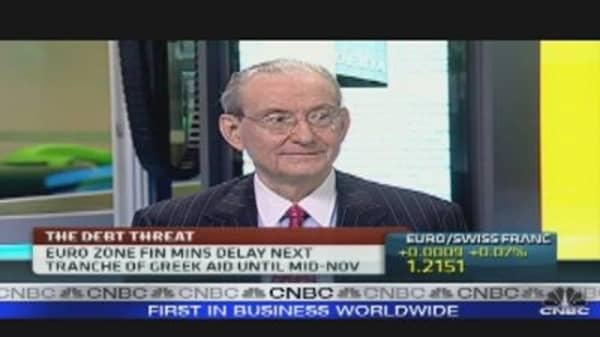The chances of the US being able to help bailout Europe are minimal because of weaknesses in the American economy, influential Citi banker William Rhodes told CNBC Tuesday.
"We (the US) have our own problems. We are certainly not the country we were under Harry Truman that proposed and implemented the Marshall Plan," he said. "People have talked about Northern Europe trying to put together some sort of Marshall Plan. They keep throwing it around but it's easier said than done."
His comments came as markets across Europe faced another day of losses, with theFTSE 100 dipping below the key 5,000 mark for the first time since July 2010.
The International Monetary Fund (IMF) should and will play a greater role in the crisis, Rhodes, senior advisor at Citi and author of Banker to the World, said.
"If the IMF would take a stronger lead role and be an anchor, a linchpin, as they were in the 1980s and 1990s, they'd get support from a lot of other countries," he said.
"The Chinese would much prefer to route the money through the IMF, where they have a big voice through Zhu Min (the Chinese deputy managing director of the IMF). That will increase resources and ability to influence things."
He called on Christine Lagarde, the former French Finance Minister who took over as managing director of the IMF in the wake of Dominique Strauss-Kahn's departure to take more of a leadership role in the euro zone debt crisis.
"The IMF has people and experience and it's natural that it should take a greater role," Rhodes, who was instrumental in debt-restructuring negotiations in Latin America in the 1980s and 1990s, said.
"It could be a win-win situation but Christine Lagarde has to take the leadership in doing so. She just got in the job and I think she is already having talks with some of these countries, so I'm hopeful that it will happen."
The euro zone debt crisis has escalated in recent months, with Greece the country seen as most likely to default on its debt repayments. Some analysts have even questioned whether the euro can survive this crisis, as people in stronger economies such as Germany bridle at expanding bailout fund the European Financial Stability Facility (EFSF).
Ratings agency Standard & Poor's (S&P) downgraded its growth forecasts for the euro region Tuesday, for the second time in five weeks. The agency now predicts gross domestic product (GDP) growth in the euro zone of 1.1 percent in 2012, compared with 1.5 percent in its earlier projection.
"The fear factor is very big because markets don't see a solution coming any time in Europe," said Rhodes. "Politicians didn't give a timetable of when they're going to see the EFSF approved and don't execute in timely fashion so markets get even more sceptical."
"At the end of the day, it comes back to Greece. What started out as a small problem has become an enormous problem," he said.
"We can lever up all we want and put all the money in but it's the ability of the Greek government to execute that will count."
A spokesman for Greek Prime Minister George Papandreou denied a report in the Financial Times Deutschland on Tuesday, which claimed he has talked about resigning in the last three weeks as the crisis unfolded.
Rhodes believes that the single currency will survive this crisis, despite its critics.
"Some Germans may look back fondly on the Deutschmark but the switch to the euro was a real benefit because it's given them this boost to exports and they have exported their way out of this problem," he said. "There's no way they would want to change at this point."
There has been renewed focus on European banks this week, as Belgian lender Dexia's shares plunged over concerns about its exposure to Greek debt.
"One of the problems in Europe is that the first set of stress tests were a farce. The second set were much better… but had a fatal flaw," said Rhodes. "They didn't take into account reserving for sovereign risk flows and a number of banks in Europe had loaded up on them because they were given a special category."
"What we are seeing happening in Europe is that some banks are selling off their core assets. If you have everyone trying to sell off assets and raise capital it's a difficult environment for the banking system," he added.
"We have some banks which will have problems raising capital and an awful lot of assets up for sale."
The euro zone is not the only factor dragging down the markets at the moment, as worries about whether China can maintain its growth levels are also affecting share prices.
The People's Bank of China has repeatedly raised interest rates and reserve requirements as it has tried to keep a lid on the country's real estate market.
"They are squeezing the RMB more rapidly and that's going to have repercussions on GDP," said Rhodes, who thinks Chinese GDP growth next year could be "as low as 8 percent" next year, compared to predictions of 9-9.5 percent.
"You will see a slowdown but it will not be a soft landing," he added. "To get a soft landing you need less than 7 percent growth."





